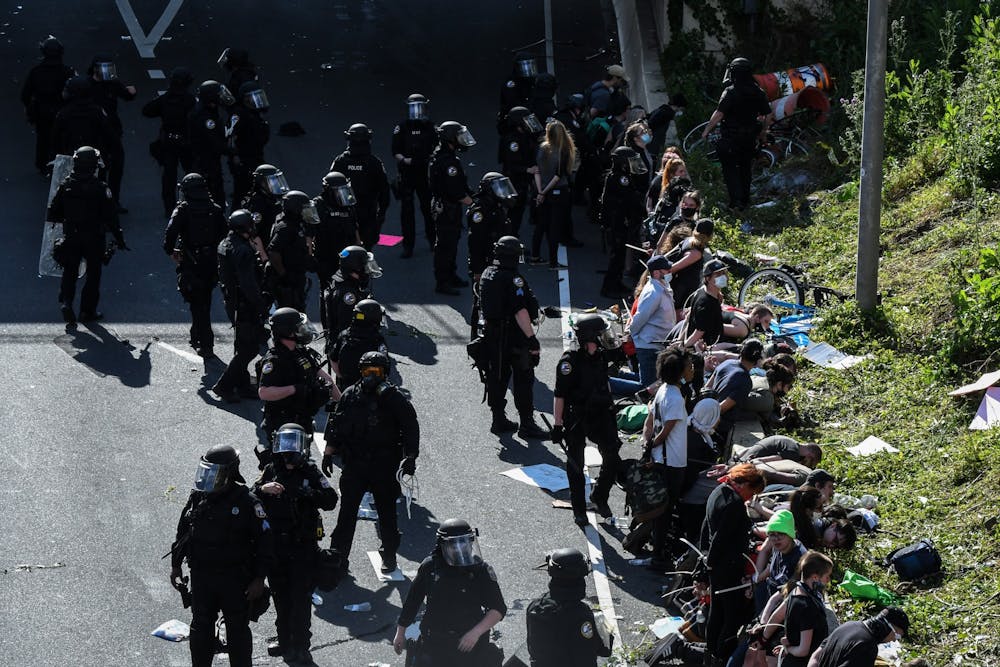
For the past few days, cities around the country have erupted with protests against racist policing following the brutal murder of George Floyd and many other Black individuals at the hands of police officers. Philadelphia has been no exception, as citizens flock to the streets to join the nationwide protests. Penn must hear the voices of these protesters both in the streets and online through petitions to take concrete actions to reduce its complicity in racial violence. The University can take immediate action by disarming the Penn Police Department, and banning the “box” asking about prior criminal records from its application for admission.
So far, the response from Penn has been tepid. In response to historic protests against violence and racism, Penn President Amy Gutmann sent the community a short statement expressing sympathy and reaffirming her commitment to creating a University environment that is “safe and welcoming for all.” The statement did not mention the word "police" once or provide any concrete changes or actions toward this end.
As a primarily white institution where Black students, faculty, and staff have faced racism from other students and the institution itself, Penn owes its Black community members more. And given the history of gentrification and over-policing at Penn’s behest, Penn owes Black Philadelphians more, too. After years of causing harm to Black students and Philadelphians, Penn needs to offer more than empty platitudes if its commitment to justice is to be believed. Instead, the University must put its immense resources and power behind the causes of justice.
No institution has the ability to solve the immense, complicated problems of racism and police violence. But as the largest employer in Philadelphia and an institution with a yearly budget measured in the billions and alumni in the highest positions of corporate and public authority across the globe, Penn owes its students, its city, and its country more than sympathy and condolences. As the protesters out on the streets of Minneapolis, Philadelphia, and other cities around the country have demonstrated, we are long past the point where words are enough. And they have not been for some time now.
There are several actions that Penn can take immediately and unilaterally that would be a great start. By banning the use of guns by police on campus, the University would protect Black members of the Penn community and the surrounding area, as well as members of other groups often targeted by the police. Racist policing is not limited to hotspots, but rather is a systemic issue across the United States. Although nobody has been shot at the hands of a Penn police officer, the University must do its part in combating the greater evil at hand -- systemic racism. In a city where Black people are disproportionately targeted by police, decreasing the likelihood that those interactions escalate to fatal violence is an important step towards reform.
Further, removing the box that applicants must check indicating if they have ever been convicted of a felony will help dismantle some of the inequities in the criminal justice system. Given that 73% of people incarcerated in Philadelphia jails are black, and that 1 in 5 people who are incarcerated are in prison for nonviolent drug offenses, the city itself has already recognized the inequities in this checkbox, and has banned it for job applications. Penn must follow suit.
Throughout American society, Black people face racial violence, particularly from the police and institutions that support and cooperate with them. If the University truly desires justice and wants to work to rectify the ills that led to George Floyd and many other Black individuals' deaths, it must take action. There is no longer space for those who want to provide sympathy and stand on the sidelines. Either you support justice, or you are against it.
Editorials represent the majority view of members of The Daily Pennsylvanian, Inc. Editorial Board, which meets regularly to discuss issues relevant to Penn's campus. Participants in these meetings are not involved in the reporting of articles on related topics.
The Daily Pennsylvanian is an independent, student-run newspaper. Please consider making a donation to support the coverage that shapes the University. Your generosity ensures a future of strong journalism at Penn.
Donate



